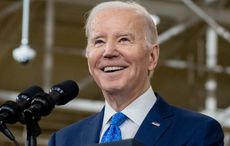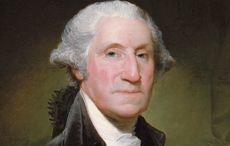Gerry Adams used the n-word in a tweet earlier this week and the house fell in. Adams was trying to use it in an expression of solidarity after viewing the movie "Django Unchained," about a freed black slave trying to rescue his wife from a plantation.
The tweet read: "Watching Django Unchained -- A Ballymurphy N----r!" He would later explain that he was trying to draw a comparison between the plight of slaves in the United States and that of Irish nationalists in Ballymurphy, an area of Belfast where British soldiers murdered civilians in 1971, an event known as the Ballymurphy massacre.
Any1 who saw Django would know my tweets&N-word were ironic.Nationalists in Nth were treated like African Americans.
— Gerry Adams (@GerryAdamsSF) May 2, 2016
It was certainly a mistake by Adams to use the N...r word, but of all the people of Ireland Northern nationalists are most entitled to the comparison given what they went through.
While black Americans use the term with each other as a form of greeting or friendship no such license for whites using the word exists.
The n-word was the ultimate insult, hurled at slaves by white slaveowners to depersonalize and belittle them, and used as a slur for generations afterwards by whites. It has been reappropriated, but the word when used by white people still has very different connotations. I have actually heard it used quite a bit in Ireland, mostly by older people who seem to have no idea that it is deeply offensive.
Still, the hysteria surrounding the Adams quote was over the top. As usual, his enemies piled on and words like uproar, crisis etc. were thrown around. (I wonder what they will do for a crust when Adams retires? They make a pretty penny attacking him.)
He quickly apologized. He was right to do so and it was an uncommon slip from the Sinn Fein leader.
Sinn Féin President Gerry Adams admits N-word tweet 'was inappropriate' https://t.co/DiWJyW4IY5https://t.co/ZEfE6BWNg3
— RTÉ News (@rtenews) May 2, 2016
But let's be clear: there is not a racist bone in his body. No one can call a pallbearer at Nelson Mandela’s funeral a racist, I hope. He was actually one of Mandela's favorite world leaders.
As Adams himself recalls of his first visit to South Africa: “Walter Sisulu, Cyril Ramaphosa, Thabo Mbeki, Cheryl Carolus and many other leaders of the ANC made us very welcome. However, for all in our group the highlight of our visit was the meeting with Madiba (Mandela’s tribal name.)
“He was self-effacing in his humor, relaxed and focused. As ever the British government, and sections of the British media, had made much about whether or not there would be a handshake, a photograph and so on. The Major government had lobbied hard for Mandela not to meet me. We shook hands in his office: "Ah, comrade Gerry," he said. "I'll not wash my hand for a week.”
Adams is deeply sympathetic to black people and their struggles, as he is to any marginalized minority.
I remember one fine Saturday in New York years ago kidding Adams and his fellow Sinn Fein leader Martin McGuinness when they elected to go to a Native American museum rather than stroll in Central Park.
Adams describes meeting Rosa Parks as one of the highlights of his life. He presented her with a gift from Ireland when they met in Detroit in 1994.
Maybe Rosa Parks had more in common with @GerryAdamsSF than the snivellers who are criticising him !!!! pic.twitter.com/VuptD0neux
— Martin McGuinness (@M_McGuinness_SF) March 17, 2016
The parallels with the American civil rights marches and Dr. King were often uppermost in people’s minds in the North.
Brian Dooley, author of "Black and Green: The Fight for Civil Rights in Northern Ireland & Black America" describes King as "an enormously powerful and symbolic figure" for civil rights struggles in Northern Ireland and the world.
"In Britain and Europe, King was seen as being on the right side of history," says Dooley, who works for the nonprofit Human Rights First in Washington, D.C. "By and large they considered the [American] civil rights movement a good thing, even while some leaders of the time pointed out the British government's own hypocrisy in regards to its treatment of Catholics as second-class citizens."
Read More: How the American civil rights movement inspired Gerry Adams
"They called themselves the 'Negroes of Northern Ireland' and they routinely sang, 'We Shall Overcome,' at their marches, which most people know as the anthem of the civil rights movement in the U.S.," Maurice Hobson, an historian and African American Studies professor at Georgia State University told NBC.
"The fight in Northern Ireland was like that TV show 'Game of Thrones;' the United Kingdom is made up of several kingdoms and many in Northern Ireland wanted their own separate nation apart from the UK. Their movement was about some Irish identifying as nationalists and wanting their own nation-state."
In early 1969, Dooley notes, campaigners even deliberately modeled a protest march after "Bloody Sunday" in Alabama.
"They set up a march from Belfast to Derry that was specifically modeled after the Selma to Montgomery march," recalled Dooley for NBC.
So let's put all this in context: Gerry Adams made an avoidable mistake, but painting him as a racist is absurd.




Comments